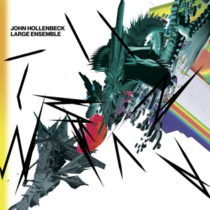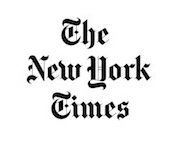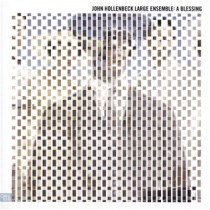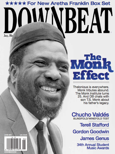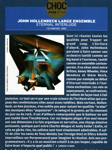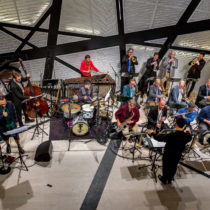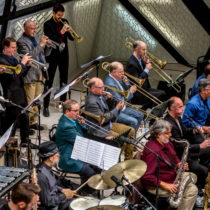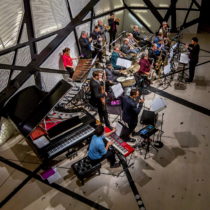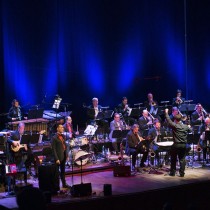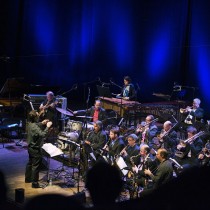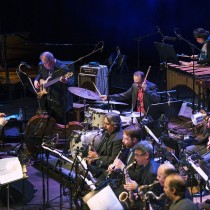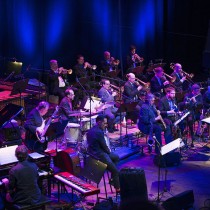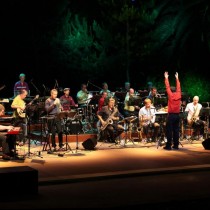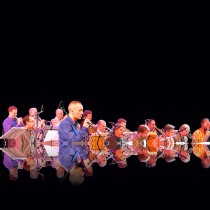Commissioned by UNC Jazz Lab I; arranged for JHLE 2018
Heyoke
Dedicated to Kenny Wheeler and John Taylor. Composed by Kenny Wheeler, arranged by John Hollenbeck
Elf
Commissioned by The Chicago Jazz Festival for for the Billy Strayhorn Centennial Celebration. Arranged for JHLE 2018.
from trees
Written for The University of the Arts School of Music & Kimmel Center for the Performing Arts for premiere at the Philadelphia International Festival of the Arts | JHLE Version
Long Swing Dream
All Can Work
Dedicated to Laurie Frink; JHLE Version
lud
DOWNBEAT 2018
“John Hollenbeck’s All Can Work is an album of awe-inspiring majesty…Hollenbeck delivers layer after layer for listeners to explore. Shimmering horns, beautifully placed punctuations and little sonic surprises abound. It’s wonderfully complex music played beautifully, with precision and abandon, by a band that has spent a good deal of time together.”
— Frank Alkyer
THE NEW YORK TIMES 2018
“John Hollenbeck, a drummer and composer, is one of today’s most dynamic orchestral jazz bandleaders, a fact that’s reinforced by the release of “All Can Work,” the arresting new album from his Large Ensemble.” — Giovanni Russonello
All Can Work
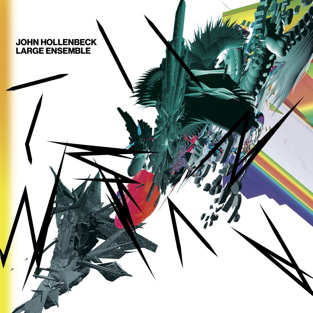
2019 GRAMMY® NOMINEE!!!
Best Large Jazz Ensemble Album
Ben Kono soprano/alto/tenor sax, flute
Jeremy Viner clarinet, tenor sax
Tony Malaby tenor/soprano sax on 3, 6
Dan Willis tenor sax, clarinet
Anna Webber flute, tenor sax on 1, 2, 4, 5, 7, 8
Bohdan Hilash clar/bass clarinet, bass sax, tubax
Mark Patterson trombone
Mike Christianson trombone
Jacob Garchik trombone, euphonium on 8
Alan Ferber trombone on 2, 3, 4, 5, 6
Jeff Nelson trombone on 1, 7, 8
Tony Kadleck trumpet, flugelhorn
Jon Owens trumpet, flugelhorn
Dave Ballou trumpet, flugelhorn
Matt Holman trumpet, flugelhorn
Chris Tordini acoustic, electric bass
Matt Mitchell piano, organ, keyboard
Patricia Brennan vibes, marimba, glockenspiel
John Hollenbeck drums, composition
Theo Bleckmann voice
JC Sanford conductor
More INFO at New Amsterdam Records
This project was supported in part by the Doris Duke Performing Artists Award and fiscally sponsored by Arete Living Arts Foundation with funding provided by The Aaron Copland Fund for Music.
KRONEN ZEITUNG 2014
JHLE LIVE at Vienna Concert House
“Delicately designed musical structures and magnificent patterns give in to meditative repetition and deepen in richness and intensity, offering a color-saturated backdrop for playfully meddlesome individual tones.” – Ki
NPR.org 2011
John Hollenbeck Large Ensemble: Newport Jazz
“As a drummer, John Hollenbeck is astoundingly precise and creative with his beatmaking. As a composer, he’s going after something akin to that: The regulated insistence of classical minimalism with the flexible color palette of jazz, plus a healthy dose of demented dry humor.”
– Patrick Jarenwattananon
ONE FINAL NOTE 2005
A Blessing
“Hollenbeck does more than pen invigorating charts. He uses his drums to italicize his writing, emphasizing the shapeliness of the lines, drawing attention to inner orchestral details.”
– David Dupont
DOWNBEAT 2011
Thunderous, Generous Spirits Pervade John Hollenbeck Large Ensemble
“Hollenbeck and the rest of the rhythm section…supplied plenty of propulsion, but the charts on pieces like “The Blessing” and “The Music Of Life” swelled with classical flourishes that made the music feel gauzy and weightless rather than traditionally muscular. ”
– K. Leander Williams
JAZZ MAGAZINE – JazzMan 2009
LA TIMES 2011
The John Hollenbeck Large Ensemble plays REDCAT…
“Under Hollenbeck’s lead, the Large Ensemble’s songs can carry a cinematic drive or ebb and flow with the elliptical grace of modern classical music. ” – Chris Barton
JHLE feat. Theo Bleckmann and Kate McGarry | “Man Of Constant Sorrow”
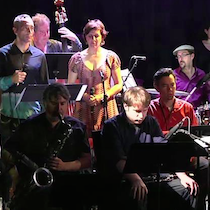
No Boat
Arranged for John Hollenbeck Large Ensemble 2009.
JHLE | Performing “Guarana” at The Painted Bride 2009
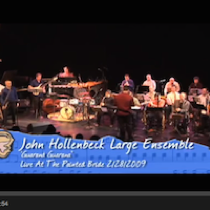
The Cloud of Unknowing
Commissioned by the Bamberg Symphony Big Band, and the Choir of the Bamberg Symphony Orchestra
[as recorded on “Wake, Awake!”, Edel Classics], arranged for Large Ensemble 2009.
THE NEW YORK TIMES 2009
Eternal Interlude
Big Band Reaches for
Bold Sounds
“But the stunner, and the evening’s most unquantifiable music, was the record’s title piece, 20 minutes of high and wide ambition, full of foreshadowings and echoings, the natural world and the digital world.” – Ben Ratliff
A Blessing
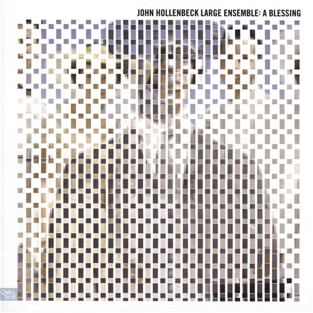
Ben Kono flute, sop/alto sax
Chris Speed clarinet
Tom Christianson ten/sop sax, English horn
Dan Willis ten/sop sax, English horn
Alan Won bari sax, bass clarinet
Rob Hudson trombone
Kurtis Pivert trombone
Jacob Garchik trombone
Alan Ferber bass trombone
Jon Owens trumpet
Tony Kadleck trumpet
Dave Ballou trumpet
Laurie Frink trumpet
Kermit Driscoll bass
John Hollenbeck drums, composition
Gary Versace piano
Matt Moran mallets
Theo Bleckmann voice
JC Sanford conductor
John Hollenbeck’s eighteen-piece band redefines improvised music for large ensemble by taking big band sound, energy, and force, and using it in a way that doesn’t sound dated or generic to create personal, non-genre specific music. In striking compositions for large ensemble, Hollenbeck, who studied with innovative arrangers Bob Brookmeyer and Jim McNeely and who draws compositional influences from Gyorgy Ligetí, Peter Garland, Brian Eno, and John Adams, reinvents “jazz big band” using novel instrumentation, sound, styles, rhythms, and material that ranges from funk, free, and straight-ahead jazz to minimalist music, African rhythms, and art song. Featuring the incredible four-octave voice of Theo Bleckmann, used both non-verbally (as an ensemble instrument) and verbally on breathtaking settings of “An Irish Blessing” and a poem by Hazrat Inayat Khan, Hollenbeck uses other out-of-the-ordinary timbres — including “bowed vibes,” English horns — admist extended melodies and overlaid rhythmic textures — to color and illuminate the stimulating music on A Blessing.
Liner Notes to A Blessing
“[John Hollenbeck’s] world view, his imagination, his daring, and his skills, combined with a God‑given gift, make him – to my ears – one of our most important composers.” -Bob Brookmeyer
John Hollenbeck doesn’t march to the beat of a different drummer; he is that drummer…and percussionist and composer. Maybe that’s why the press have chosen to use expressions like “beyond jazz” to describe his work. And maybe that’s why interdisciplinary performance pioneer Meredith Monk enlisted John to collaborate on her recent projects and calls him “one of the most brilliant musicians I’ve had the privilege of working with.”
John doesn’t feel like he’s being purposefully rebellious in his music (though he continues to proudly include in his e‑mails a review quote that asks about his music, “What the hell is it?”). John avers, “I’m not making a special effort; I am just being myself. I have always instinctively looked for my own personal vision. It is a blessing and a curse.”
He considers the music he writes and his playing to be “one in the same,” though he feels that his playing style has changed so he can better hear the music he’s written. John also sees no discontinuity between writing for small or large groups, both of which he simply treats as “ensembles of musicians” – a point emphasized by calling the 18‑piece aggregation on this CD the Large Ensemble. “I want to take the big band sound, energy, and force, and use it in a way that doesn’t sound dated or generic,” John elucidates, “to create personal, non‑genre‑specific music.”
From first listen, you can hear something different with this music, and given its pan‑genre or even genre‑bending sounds and feels, a look at the list of composers who John says influenced his large ensemble writing helps explain why. The list starts with jazz composers and arrangers Maria Schneider, Jim McNeely, Bob Brookmeyer, Gil Evans, and “the Stan Kenton writers,” and reaches to leading innovators in fields of 20th century music including Gyorgy Ligetí, Peter Garland, Brian Eno, Steve Reich, and John Adams. One might even suspect that John’s list would include his neighbor, musical innovator and AACM founder Muhal Richard Abrams, to whom he pays tribute on this album on “RAM.”
It’s not surprising then that the varied timbres that color and illuminate the music on A Blessing further set apart its sounds from those on other large ensemble recordings. In addition to the fascinating extended melodies and overlaid rhythmic textures that are trademarks of John’s approach, ask yourself when (if ever) was the last time you heard “bowed vibes” (literally, bowing vibraphone keys using a bass bow) or English horn or voice used the way they are on this recording.
Even otherwise quirky juxtapositions of materials and ideas make sense together when John combines them. “April in Reggae” replete with a quote from “April in Paris” toward the end is a tune John intended to “swim in between reggae and swing.” His 2002 International Association of Jazz Educators/ASCAP Commission “Folkmoot,” which honored pianist and radio host Marian McPartland, becomes a musical meeting of McPartland and saxophonist/composer Jimmy Giuffre, with Gary Versace on piano representing McPartland and Dan Willis on English horn representing Giuffre. Explains John, “Marian McPartland’s Piano Jazz theme is thrown around until the ending, when it is stated verbatim. (Since the piece was really dedicated to her, she won the argument.)”
For voice, the band has the vocally astounding Theo Bleckmann, whom John describes as one of his closest friends and whom, along with mallet man Matt Moran, he calls “the band’s secret weapon.”
“I think people, especially non‑musicians, like the voice because it brings the music closer to their own world. It is easier to relate to, because everyone at least possesses that instrument,” explains John. “I have always personally liked the voice more as an ensemble instrument and less as a foreground lead instrument, as it is usually used.”
Theo’s non‑verbal voice can be heard instrumentally permeating the record, ranging from the panting and grunting in “Weiji,” to sci‑fi outer space sounds whirring by in “Abstinence,” to instilling pure and ethereal tone as it intermingles with bassist Kermit Driscoll’s bass harmonics at the end of “The Music of Life.”
More traditionally, though hardly conventionally, Theo delivers two texts – a blessing and a prayer – that appropriately enough frame A Blessing.
John wrote “A Blessing,” also commissioned in 2001 by the IAJE, to feature Theo, and he based it on the words to the Irish Blessing that were printed on the mass card at his grandmother’s funeral. “While I had seen this text many times, it didn’t resonate with me until that moment,” recalls John. “Often, I pick a subject to write about based on an ideal of how I wish I could be, or the how the world could be.” Likewise, “The Music of Life,” with words from Hazrat Inayat Khan, fits that utopian ideal. John describes the piece as “a simple chant‑like piece that sums up why we are doing what we are doing. Because we feel that music can change lives, it can heal.”
It’s that kind of sensitivity combined with imagination and respect that allows the exceptionally creative music on this recording to energetically uplift the listener and confer a certain musical grace, reflected in the album’s particularly apt title. Adds John, “I like the title, because it can immediately be taken in many different ways. It is a blessing to listen to music, to play music, to live, to die. This music is a blessing; all music is a blessing; my grandmother was a blessing; everyone is a blessing.” – Frank Tafuri
eternal interlude
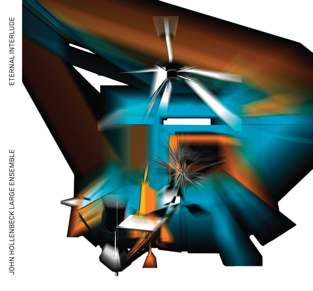
Foreign One – commissioned by Scottish National Jazz Orchestra and is dedicated to composer Thelonious Monk and based on his composition “Four in One.”
eternal interlude – commissioned by Gotham Wind Symphony and Sigi Feigl.
Guarana – commissioned by University of Northern Colorado Jazz Ensemble.
The Cloud – commissioned by Bamberg Symphony Choir and Big Band.
Perseverance – commissioned by Orquestra Jazz de Matosinhos.
Ben Kono flute, sop/alto sax, whistling (4)
Jeremy Viner clarinet/tenor sax
Tony Malaby ten/sop sax
Dan Willis ten/sop sax, flute, Eh., whistling (4)
Bohdan Hilash cl., bass/contra-alt cl., whistling (4)
Ellery Eskelin tenor saxophone (5, 6)
Rob Hudson trombone, whistling (4)
Mike Christianson trombone, whistling (4)
Jacob Garchik trombone, thn. (2), whistling (4)
Alan Ferber trombone
Tony Kadleck trumpet, flugelhorn
Jon Owens trumpet, flugelhorn, whistling (4)
Dave Ballou trumpet, flugelhorn
Laurie Frink trumpet, flugelhorn
Kermit Driscoll acoustic/electric bass
Gary Versace piano, organ, keyboard
Matt Moran mallet percussion (1, 3, 4)
John Ferrari mallet percussion (2, 5, 6)
John Hollenbeck drums, comp., whistling (4)
Theo Bleckmann voice, whistling (4)
JC Sanford conductor
john hollenbeck large ensemble
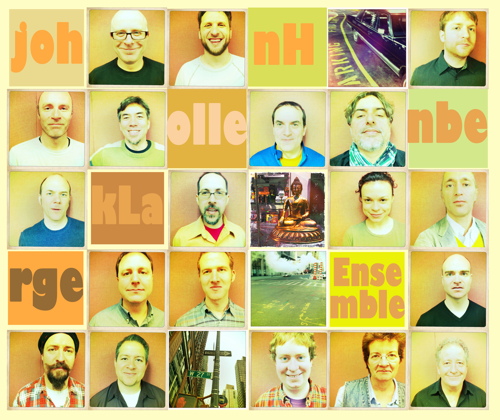
Ben Kono sop/alto/ten sax, flute
Jeremy Viner clarinet/tenor sax
Anna Webber tenor sax, flute
Tony Malaby ten/sop sax
Dan Willis ten/sop sax, english horn, flute
Bohdan Hilash contra-alto clar, bass sax, clar
Mark Patterson trombone
Mike Christianson trombone
Jacob Garchik trombone
Alan Ferber trombone
Tony Kadleck trumpet, flugelhorn
Jon Owens trumpet, flugelhorn
Dave Ballou trumpet, flugelhorn
Matt Holman trumpet, flugelhorn
Chris Tordini acoustic/electric bass
Matt Mitchell piano, organ, keyboard
Patricia Brennan mallet percussion
John Hollenbeck drums, composition
Theo Bleckmann voice
JC Sanford conductor
“John Hollenbeck, a drummer and composer, is one of today’s most dynamic orchestral jazz bandleaders, a fact that’s reinforced by the release of “All Can Work,” the arresting new album from his Large Ensemble.” — Giovanni Russonello, The New York Times
John Hollenbeck is one of the rare artists who have mastered the tradition of big band composition while crossing aesthetic boundaries and speaking directly to the time we live in today. His music is a daring mix of pure, heart-on-sleeve lyricism and robust rhythmic propulsion, and an audacious example of the power of big band jazz to express emotions well beyond swing-era clichés. His music for this group has earned acclaim for its rich, panoramic orchestral textures that retain the power of its members’ individual voices.
Unlike most contemporary big bands, this is no random agglomeration of freelancers – the John Hollenbeck Large Ensemble is an actual band consisting of top New York musicians. John had been writing for big band since he was in college at the Eastman School of Music and eventually formed the John Hollenbeck Large Ensemble in 1998 as an outlet to write the kind of music that wasn’tbeing written for this style of big band: “I saw some things that could be done that weren’t being done, and I thought there might be some other possibilities with a group that still has traditional instrumentation but the music itself is not traditional.”He gathered together a core group of musician friends who he had studied with at Eastman, and then selected a group of New York City musician friends and colleagues to complete the ensemble, creating a fine balance of camaraderie, integrity and talent – the perfect outlet for the creative expression of his music.
“John Hollenbeck’s 18-piece Large Ensemble can explode with rhythmic drive and technical dazzle, or it can evoke serene calm, tone poetry and even prayer. It’s a big band for a new eclectic world, building on the legacy of seminal big-band composer Bob Brookmeyer and other role models. Hollenbeck holds it together with intricate drumming, compositional acumen and searing wit as he marshals the resources of top jazz improvisers, including saxophonist Tony Malaby and vocalist, Theo Bleckmann.” — David Adler, TimeOut New York
The John Hollenbeck Large Ensemble’s third album, All Can Work, was released to critical acclaim onNew Amsterdam Records in January, 2018 and pays tribute to the Large Ensemble’s late trumpet player Laurie Frink, a key force in the group and the jazz community. All Can Workgarnered the ensemble’s third GRAMMY nomination – their second album eternal interludeand their debut release ,A Blessing, all earned GRAMMY nominations for Best Jazz Large Ensemble Album. As Downbeat Magazine’s Frank Alkyer said of the group’s latest release: ” John Hollenbeck’s All Can Workis an album of awe-inspiring majesty…Hollenbeck delivers layer after layer for listeners to explore. Shimmering horns, beautifully placed punctuations and little sonic surprises abound. It’s wonderfully complex music played beautifully, with precision and abandon, by a band that has spent a good deal of time together.”
Royal Toast
Wind 1 – Flute
Electric Guitar
Wind 1 – Flute
Electric Guitar
John Hollenbeck Large Ensemble
JHLE at Vienna Concert House | February 2014
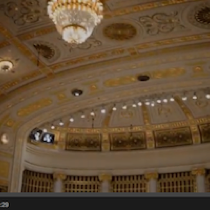

 MENU
MENU